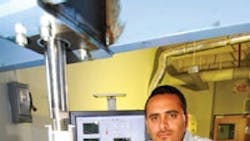A Georgia Institute of Technology professor believes his machine models can more accurately predict the amount of remaining useful life of different mechanical devices, including electrical systems, than current sensor-based predictive methods.
Nagi Gebraeel, an assistant professor in Georgia Tech's engineering school, has created stochastic models (measures of probability) to identify condition-based signals, which could be used to predict maintenance needs of critical components. Gebraeel says his tests can reduce total failure costs and expenses related to depletion of spare-parts inventory by 55%.
One difference between Gebraeel's sensor-based models and other sensor-based predictive technologies already in use is the ability to measure the entire history of sensor signals and how they evolved as opposed to traditional predictive methods that rely on current condition monitoring information, Gebraeel says.
In addition, Gebraeel's system is designed to link information gathered by the sensors with parts inventory optimization, he says. The system works by integrating probability distributions with condition monitoring techniques to determine the machine's state of health.
Gebraeel plans to implement his prognostic methodology into avionic systems to signal whether an aircraft can carry out a specific mission or if it should be assigned to a shorter mission or grounded.
He's also collaborating closely with Virginia-based Global Strategic Solutions LLC to create embedded diagnostics and prognostics that can be used to predict the lifespan of electrical power generation systems on board U.S. Naval aircraft.
See Also
About the Author
Jonathan Katz
Former Managing Editor
Former Managing Editor Jon Katz covered leadership and strategy, tackling subjects such as lean manufacturing leadership, strategy development and deployment, corporate culture, corporate social responsibility, and growth strategies. As well, he provided news and analysis of successful companies in the chemical and energy industries, including oil and gas, renewable and alternative.
Jon worked as an intern for IndustryWeek before serving as a reporter for The Morning Journal and then as an associate editor for Penton Media’s Supply Chain Technology News.
Jon received his bachelor’s degree in Journalism from Kent State University and is a die-hard Cleveland sports fan.
